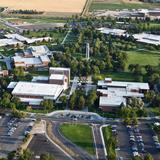- The mission of Great Basin College is to provide superior, student-centered, post-secondary education in central and northeastern Nevada. We provide five types of educational opportunities: university transfer courses, occupational and technical studies, developmental courses, community education and selected baccalaureate programs, along with student support services and special business-education partnerships.
School Highlights
Great Basin College serves 4,472 students (26% of students are full-time).
The college's student-teacher ratio of 15:1 is lower than the state community college average of 22:1.
Minority enrollment is 46% of the student body (majority Hispanic), which is less than the state average of 66%.
Quick Facts (2026)
- Enrollment: 4,472 students
- In-state tuition: $2,700
- Out-state tuition: $9,345
- Student-teacher ratio: 15:1
- Minority enrollment: 46%
- Source: Integrated Postsecondary Education Data System (IPEDS)
Top Rankings
Great Basin College ranks among the top 20% of public schools in Nevada for:
Category
Attribute
Affordability
School Overview
The teacher population of 289 teachers has stayed relatively flat over five years.
Great Basin College
(NV) Community College Avg.
Carnegie Classification
Baccalaureate/Associate's Colleges: Mixed Baccalaureate/Associate's
Not applicable, not in Carnegie universe (not accredited or nondegree-granting)
Institution Level
Less than 2 yrs
At least 2 but less than 4 years
Institution Control
Public
Private for-profit
Total Faculty
289 staff
90 staff
Student Body
The student population of Great Basin College has grown by 18% over five years.
The student-teacher ratio of 15:1 has decreased from 29:1 over five years.
The Great Basin College diversity score of 0.62 is less than the state average of 0.75. The school's diversity has grown by 10% over five years.
Total Enrollment
4,472 students
4,141 students
Student-Teacher Ratio
15:1
22:1
# Full-Time Students
1,151 students
820 students
# Part-Time Students
3,321 students
3,321 students
# Enrollment Undergraduate
447 students
396 students
# Full-Time Undergraduate Students
1,151 students
820 students
# Full-Time Graduate Students
14 students
14 students
# Part-Time Undergraduate Students
n/a
3,555 students
# Part-Time Graduate Students
n/a
16 students
Total Dormitory Capacity
n/a
100 students
% American Indian/Alaskan
2%
1%
% Asian
4%
9%
% Hispanic
26%
34%
% Black
5%
9%
% White
54%
34%
% Hawaiian
1%
2%
% Two or more races
5%
7%
% Non Resident races
n/a
1%
% Unknown races
3%
3%
Diversity Score
0.62
0.75
College Completion Rate (Students who graduate in less than 4 years)
n/a
65%
College Completion Rate (Students who graduate in 4 years or more than 4 years)
48%
34%
Average Graduate Earnings (10 Years)
$37,800
$32,800
Tuition and Acceptance Rate
The public in-state tuition of $2,700 is equal to the state average of $2,700. The in-state tuition has declined by 16% over four years.
The public out-state tuition of $9,345 is equal to the state average of $9,345. The out-state tuition has declined by 11% over four years.
In-State Tuition Fees
$2,700
$2,700
Out-State Tuition Fees
$9,345
$9,345
% Students Receiving Some Financial Aid
60%
90%
Median Debt for Graduates
$12,654
$9,500
Median Debt for Dropouts
$5,532
$4,718
Acceptance Rate
n/a
90%
Source: 2024 (or latest year available) Integrated Postsecondary Education Data System (IPEDS)
School Notes
- Founded in 1967, Elkoans bootstrapped a community college, the state's first. Its founders, who called themselves the "Yo Yo Club" because of the ups and downs of the project, had rallied townspeople to the cause. A stir for a technical college had begun in the early 1960s. Fred Harris and Mark Chilton offered land in 1962 on the Mountain City Highway to the university regents for a campus. But the regents, amused, focused on surging Southern Nevada, which was to become the University of Nevada-Las Vegas in 1968. Our occupational and technical studies are developed to meet the demands of the local economy. Our programs lead to immediate and meaningful employment for our students. For the employer, we provide short- and long-range training programs that create a productive workforce that knows how to learn and to work in harmony with others. Elizabeth Griswold Hall, the College's newest residential hall, has opened its doors to students. Griswold Hall is another convenient option for new and continuing students. This hall is fully outfitted with high-speed Internet connections, a game room, group and individual study nooks, laundry rooms, and kitchen facilities. The Residence Suites on campus also offer apartment style living for individual and family students. Great Basin College is regionally accredited by the Northwest Commission on Colleges and Universities. GBC is a member college of the Nevada System of Higher Education (NSHE).
Frequently Asked Questions
How much does Great Basin College cost?
Great Basin College's tuition is approximately $2,700 for In-State students and $9,345 for Out-State students.
What schools are Great Basin College often compared to?
Great Basin Collegeis often viewed alongside schools like College of Southern Nevada by visitors of our site.
What is Great Basin College's ranking?
Great Basin College ranks among the top 20% of community college in Nevada for: Least expensive tuition.
Recent Articles

Community College Rankings by Category 2026
Explore the 2026 community college rankings by category, including affordability, transfer success, online programs, and workforce outcomes.

Most In-Demand Community College Majors for 2026
Discover the most in-demand community college majors for 2026, including healthcare, tech, skilled trades, and business programs with strong job growth.

From Community College to Ivy League: Is It Possible?
Can students transfer from community college to the Ivy League? Explore pathways, data, 2026 trends, and expert insights.










